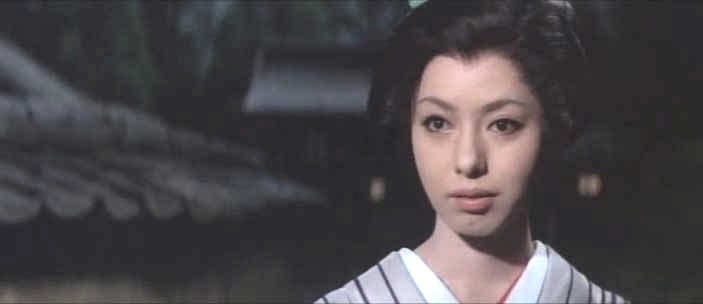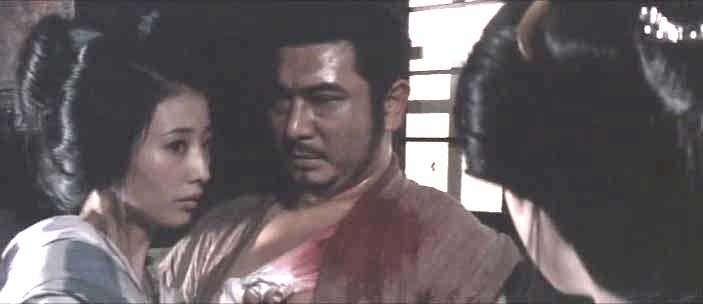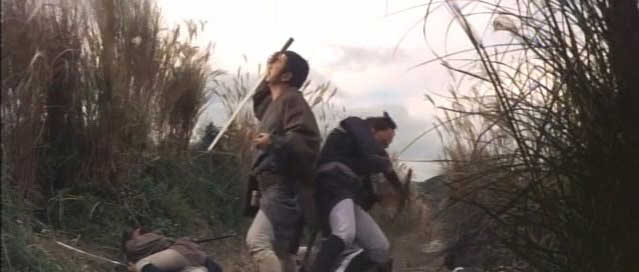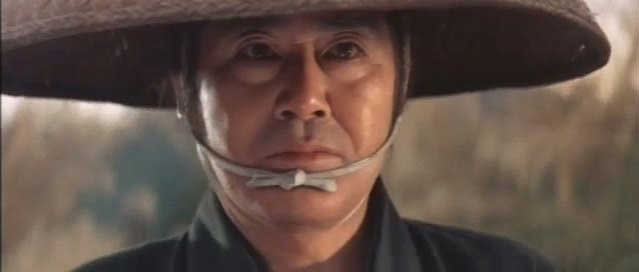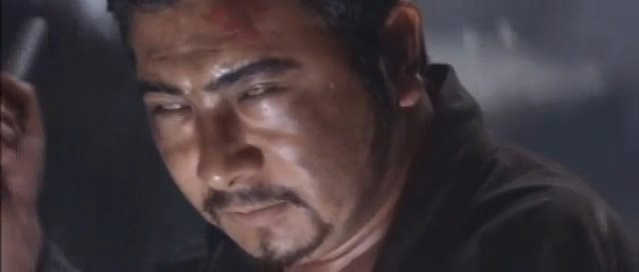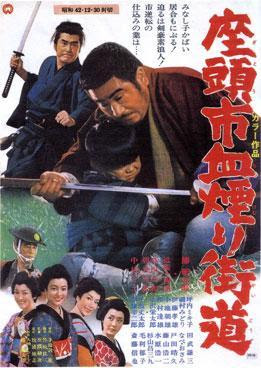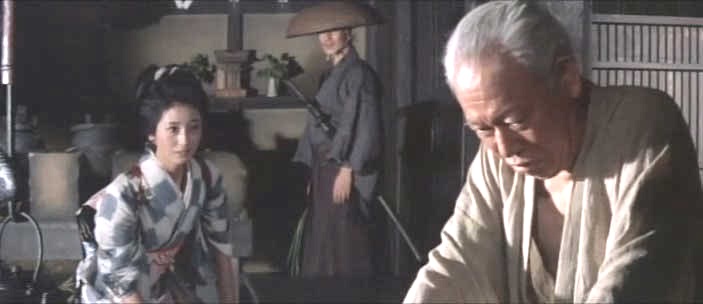Zatoichi - 16 - 18
Zatoichi
the Outlaw (1967) – 8.0
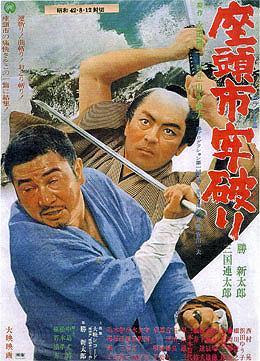
It has been months since I watched my last
Zatoichi film. There are a finite number - 26 of them - and this is the 16th.
Then there is the TV show as well which I have some of. So I want to take
my time with these films. Right at the beginning of the film it proudly announces
that this is the first from Katsu Production - though still in partnership
with Daiei who had produced the previous fifteen. Shintaro Katsu who plays
Zatoichi was moving into the production side of things and over the years
made a number of films generally in the Yakuza or Samurai genre. The most
famous being the Lone Wolf series with his brother as the star and Hanzo the
Razor series in which Shintaro as Hanzo lifts weights with his penis. Harder
than it sounds. The Lone Wolf series is famous for its violence with graphic
displays of blood-letting.
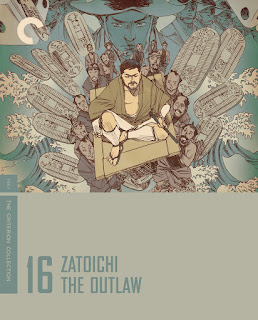
So it appears that Shintaro was pushing
the boundaries of good taste - at least for the times. There is plenty of
killing in the Zatoichi films but they tend to come near the end and not be
overly graphic. One quick cut and two or three guys fall down dead. So how
does this effect this first Zatoichi? For the most part it is the same old
Zatoichi who loves a good meal and the roll of the dice but there are touches
here and there. It has a few scenes that have nothing really to do with the
plot - thrown in there for atmosphere or comedy perhaps. One of him winning
an archery contest and another with him rooming with a group of pervy blind
masseurs who all hate him because he doesn't letch on passing women.
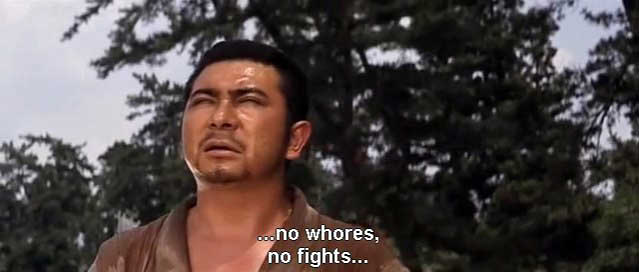
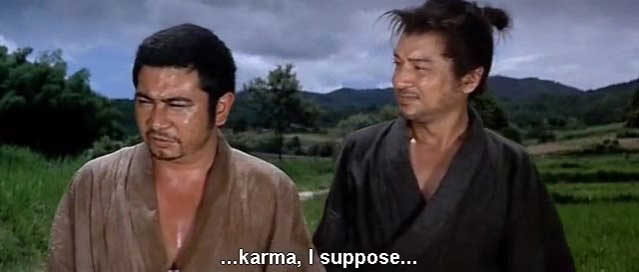
But what really sets the film apart isn't
stylistic but a philosophical tone - a moral one. In many of the Zatoichi
films there has always been this conflict within himself about what kind of
man he wants to be. The evil of killing. Karma. He often makes penitence for
those he has murdered and even gone as far as looking up their family to
make amends. It burdens him. The killing is easy but not the guilt of the
always increasing body count of souls weighing down on him. Here this conflict
takes on a human form to counter him.
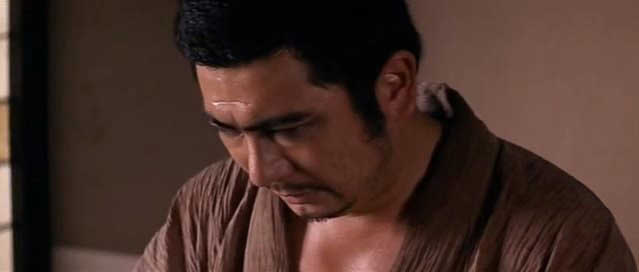
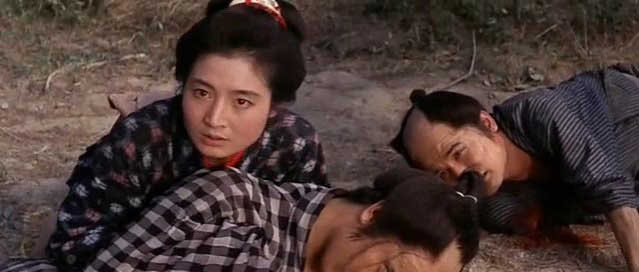
On the road he meets a Ronin, Oharu Shushi
(Mizuho Suzuki), who is basically a Christ figure. He has thrown away his
sword, preaches peace, fidelity, working together, not gambling or whoring
to the farmers. A few little symbols enforce this thinking - when he is forced
to leave his home a cross bars entry and later he tells the authorities "The
Imperial Throne and the Shogunate don't matter anymore". In a song that Zatoichi
hears them singing "You mustn't have an affair with another man's wife. No
more fights. No more whores". What kind of a town is this Zatoichi wonders.
Zatoichi enters into conversations with this Ronin in which they talk about
the evil of killing. He asks Zatoichi "How many people have you killed?" Zatoichi
can't answer because either he doesn't know or is too ashamed.
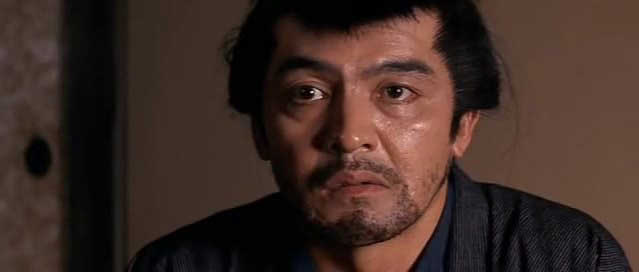
This preaching doesn't please one of the
two local casino owners. He wants to have people gamble, cheat them and then
take their land. The other casino owner, Asagoro (Rentaro Mikuni), does his
best to keep the farmers afloat lending them money. Zatoichi greatly respects
him. The other casino owner sends men to kill Zatoichi because he knows of
his reputation and that sooner or later Zatoichi will come for him. He does,
but the film is only half over. The bad guy is dead. The farmers are free
of debt. So Zatoichi leaves as he always does. But in protecting himself,
he has killed a young attacker - who has a girlfriend - and Zatoichi's karma
envelops another to tragic ends. Every action has ramifications though you
may never see them.
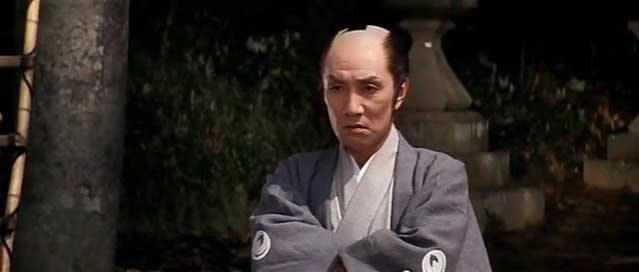
Months later he hears rumors that Asagoro
is worse than the other casino owner. The devil in disguise. Zatoichi is shocked
that he was taken in. Asagoro along with a government official (the pinched
face of Kô Nishimura) arrest the Ronin for sedition. For preaching revolution
ala Jesus. He is put in a cage to take to Edo for execution. Zatoichi has
an injured leg and the farmers have to put him on a board and carry him like
a vengeful Buddha to stop the men. Peace and non-violence is good to believe
in Zatoichi says but in a violent world sometimes you need the Sword of Death
at your side.
Zatoichi Challenged
(1967) – 7.0
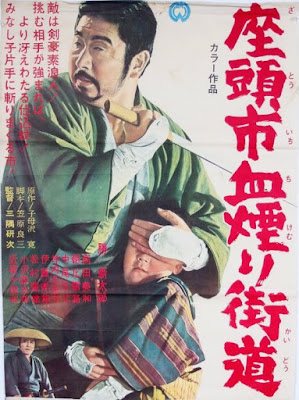
This is the 17th in the Zatoichi film series.
These films can be broken into basically two types of plots. There are the
ones that have loads of action and a kill count well into the dozens or those
that slowly build up the drama and characters leading to the finale which
is always worth its weight in popcorn. These latter ones can sometimes be
very contemplative about life, karma and his place in it or just a simple
story. This is a simple story of Zatoichi as usual being in the wrong place
at the wrong time and then having to do the right thing to uphold his honor
or that of others. Not that it doesn't start with a bang as to the strumming
of a Spanish guitar five men run down the road in order to kill Zatoichi.
A minute later Zatoichi is on his way again. But this is witnessed by a lone
Samurai who tips his hat to Zatoichi. We know we will be seeing this samurai
(Jushiro Konoe) again.
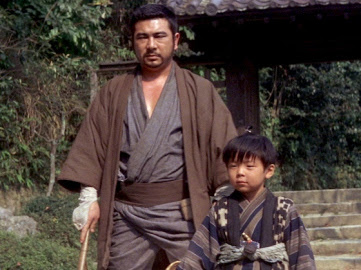
He stops off at an inn and has to share
the room with a woman who has a young boy. She is dying and her last wish
is that Zatoichi take the boy to his father in another town. He grumbles but
agrees. The boy is a brat but a promise made is a promise kept for Zatoichi
no matter the hardship. On the way he and the boy hitch a ride with a travelling
troupe of entertainers and when they are later threatened by Boss Gonzo you
think this is where the story will stay - but Zatoichi moves on because he
needs to get rid of this annoying child. He arrives in the town but of course
nothing is easy. The father is being held captive by Gonzo in order to paint
pornography that fetches large prices. And that darn Samurai keeps showing
up. Zatoichi of course has to go up against Gonzo and his men - but the samurai
is once again on the scene and demands that Zatoichi hand over the father
to him. Zatoichi cannot break a promise - you damn samurai he yells. One of
the better endings in a Zatoichi film.
Directed by Kenji Misumi who not only directed
a number of the Zatoichi films but also a few of the Sleepy Eyes of Death,
one of the Hanzo the Razor films, most of the Lone Wolf and Cub films and
even one of the Daimajin trilogy.
Zatoichi and the
Fugitives (1968) - 9.0
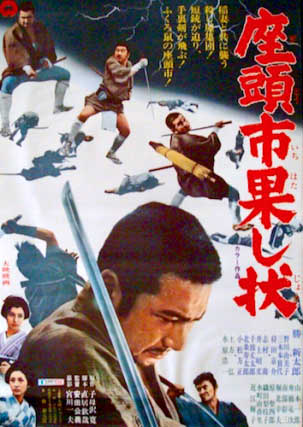
It feels a little absurd calling the 18th
film in this long-running series a masterpiece but this is damn close. It
has the usual Zatoichi characteristics that we have come to expect. The lone
masseuse wandering from town to town, running into an injustice that he can't
turn away from and leaving a trail of dead bodies behind him when he moves
on. But it is how you surround these basic plot points that matter. The little
stuff. The ceremony, the traditions, the rituals, the saké well drunk,
the quiet moments and the slow inevitable death march. This film has one brilliantly
staged scene after another - both action scenes and the suggestion of action.
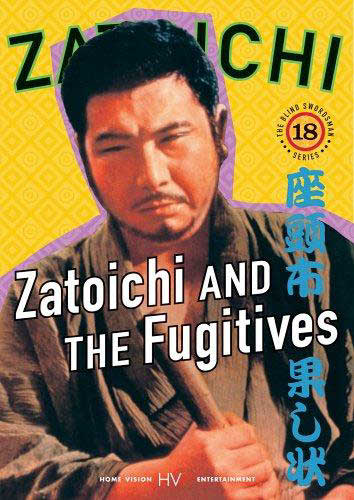
There is this beautiful bit near the end.
Zatoichi has been shot and badly wounded, barely able to stand, his clothes
blood soaked. He has a large group of killers searching for him and has found
refuge in the poor home of a family that he helped earlier in the film. He
is nearly unconscious when their son rushes in and tells his parents that
the doctor and his daughter have been taken away by the villains. The father
says don't tell Zatoichi. The camera pans to Zatoichi lying in bed, near death
and his eyes flutter and he reaches for his sword. The film cuts to the boy
yelling to his parents that Zatoichi is gone. And then a stunning shot of
Zatoichi walking through a wheat field with ominous dark clouds filling the
screen as he goes to mete out death. When he comes face to face with
one of his enemies he tells him "I came back from Hell to get you. They won't
let me cross the River of the Three Crossings without you". And the killing
begins.
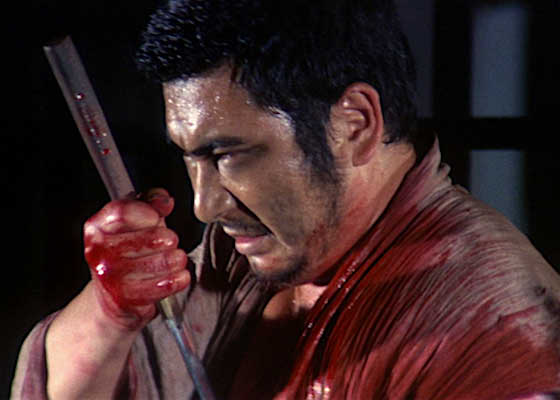
Zatoichi of course never looks for trouble.
It just finds him like a dog and a bone. It begins with a pouring rain and
a bedraggled Zatoichi finding cover in an empty hut. He asks if anyone is
there but gets no answer but off in the corner is a beautiful woman with a
light blue shawl covering parts of her face. This is Oaki played by Yumiko
Nogawa, who a few years later was so good as the female gambler in the Cat
Gambler series. We learn as we go along that she is part of a gang of vicious
fugitives who are on the run but murdering and raping as they go.
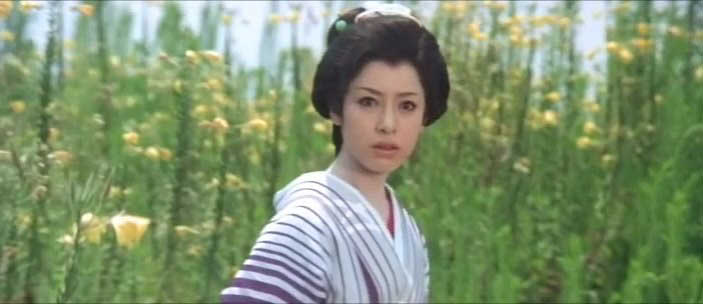
Two of them come up to Zatoichi and put dirt and rocks into his rice as he
sits eating on the side of the road. Don't fuck with a man's rice bowl. He
spits it in their faces and they reach for their swords. They didn't know
when they woke up that morning that they were going to die that day. Their
leader Ogano (Kyôsuke Machida) had seen Zatoichi kill a falling snake
out of a tree and keeps warning his group, don't even think about attacking
him or you will lose your heads.
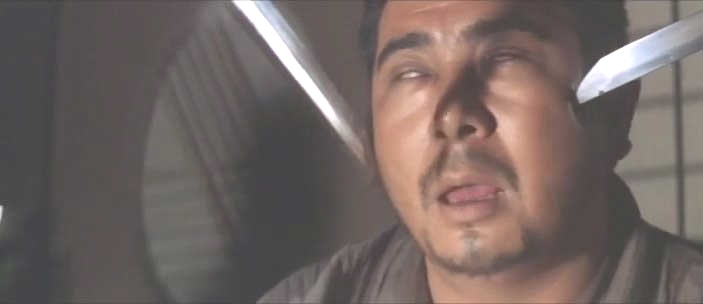
But that is not how these things go. He
also comes across the town Boss Matsugoro (Hôsei Komatsu) whose corruption
is written across his face in bold print. It is only a good doctor (the wonderful
fish-mouthed Takashi Shimura) and his pretty daughter (Kayo Mikimoto) who
take Zatoichi in when he is looking for work. Zatoichi has a wonderful lyrical
scene with her out in the fields collecting herbs. She asks him how old he
was when he went blind. 8 years old. So you must remember things like colors.
"I tried so hard to hold on to them but over time they faded away. Now I only
see darkness". And he could have added dead men. His life is darkness. Death
follows him like a tragic shadow. Much is to come very soon.
Directed by Kimiyoshi Yasuda who had already
directed three Zatoichi’s along with some Sleepy Eyes of Death and many other
sword fighting films.
